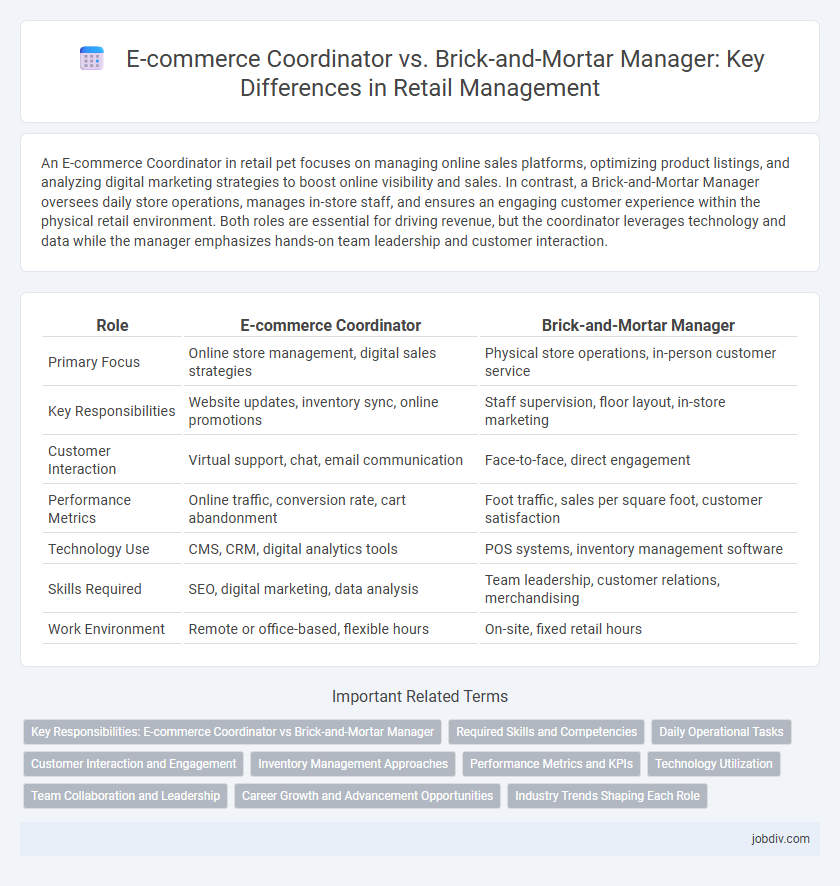An E-commerce Coordinator in retail pet focuses on managing online sales platforms, optimizing product listings, and analyzing digital marketing strategies to boost online visibility and sales. In contrast, a Brick-and-Mortar Manager oversees daily store operations, manages in-store staff, and ensures an engaging customer experience within the physical retail environment. Both roles are essential for driving revenue, but the coordinator leverages technology and data while the manager emphasizes hands-on team leadership and customer interaction.
Table of Comparison
| Role | E-commerce Coordinator | Brick-and-Mortar Manager |
|---|---|---|
| Primary Focus | Online store management, digital sales strategies | Physical store operations, in-person customer service |
| Key Responsibilities | Website updates, inventory sync, online promotions | Staff supervision, floor layout, in-store marketing |
| Customer Interaction | Virtual support, chat, email communication | Face-to-face, direct engagement |
| Performance Metrics | Online traffic, conversion rate, cart abandonment | Foot traffic, sales per square foot, customer satisfaction |
| Technology Use | CMS, CRM, digital analytics tools | POS systems, inventory management software |
| Skills Required | SEO, digital marketing, data analysis | Team leadership, customer relations, merchandising |
| Work Environment | Remote or office-based, flexible hours | On-site, fixed retail hours |
Key Responsibilities: E-commerce Coordinator vs Brick-and-Mortar Manager
E-commerce Coordinators manage online sales platforms, optimize product listings, track digital marketing campaigns, and analyze web traffic to enhance customer engagement and drive online revenue growth. Brick-and-Mortar Managers oversee daily store operations, manage in-store staff, maintain inventory levels, and ensure an excellent customer experience within the physical retail environment. Both roles require strategic planning and operational efficiency but differ in their focus on virtual versus physical sales channels.
Required Skills and Competencies
E-commerce Coordinators must excel in digital marketing, data analytics, and content management systems to optimize online sales and customer engagement. Brick-and-Mortar Managers require strong leadership, inventory control, and in-store customer service skills to maintain seamless daily operations and enhance the physical shopping experience. Both roles demand strategic planning and communication abilities, yet differ in technical expertise and direct consumer interaction.
Daily Operational Tasks
E-commerce Coordinators manage online inventory updates, coordinate digital marketing campaigns, and oversee order fulfillment processes to ensure seamless customer experiences on e-commerce platforms. Brick-and-Mortar Managers supervise in-store staff, maintain physical inventory, and handle on-site customer service to optimize day-to-day store operations. Both roles require strong organizational skills, but e-commerce focuses on digital tools and data analytics, while brick-and-mortar emphasizes face-to-face interactions and physical merchandising.
Customer Interaction and Engagement
E-commerce Coordinators leverage digital platforms to analyze customer behavior and implement targeted online marketing strategies that enhance user engagement and streamline the purchase journey. Brick-and-Mortar Managers emphasize face-to-face customer interaction, fostering personal relationships and immediate feedback to improve in-store experiences. Both roles prioritize customer satisfaction but utilize different channels and tactics to drive engagement and loyalty.
Inventory Management Approaches
E-commerce Coordinators utilize advanced inventory management software and real-time data analytics to track stock levels, manage supplier relationships, and forecast demand across multiple online channels, ensuring seamless order fulfillment and customer satisfaction. Brick-and-Mortar Managers rely on physical inventory counts, point-of-sale systems, and local supplier networks to maintain product availability and optimize shelf space within single or multiple store locations. Integrating digital tools with traditional inventory practices enhances accuracy, reduces stockouts, and improves overall supply chain efficiency in both retail environments.
Performance Metrics and KPIs
E-commerce Coordinators primarily track metrics such as website traffic, conversion rates, average order value, and cart abandonment rates to optimize online sales performance. Brick-and-Mortar Managers focus on KPIs like foot traffic, in-store sales per square foot, average transaction value, and customer dwell time to enhance physical store profitability. Both roles require analyzing customer behavior data, but the specific performance indicators reflect the distinct sales environments they manage.
Technology Utilization
E-commerce Coordinators leverage advanced digital tools such as content management systems, data analytics platforms, and customer relationship management software to optimize online sales and enhance user experience. Brick-and-Mortar Managers utilize point-of-sale systems, inventory management software, and in-store analytics technology to streamline operations and improve customer service within physical retail locations. Both roles require proficiency in technology, but their focus differs significantly with digital ecosystems driving e-commerce and physical infrastructure guiding brick-and-mortar management.
Team Collaboration and Leadership
E-commerce Coordinators excel in virtual team collaboration, leveraging digital communication tools to synchronize marketing, IT, and customer service teams for seamless online operations. Brick-and-Mortar Managers focus on in-person leadership, fostering direct team engagement and hands-on supervision to enhance customer experience and store performance. Both roles require adaptive leadership skills but differ fundamentally in managing remote versus on-site teams within retail environments.
Career Growth and Advancement Opportunities
E-commerce Coordinators benefit from rapid career growth due to the expanding digital retail sector, gaining expertise in online marketing, data analytics, and user experience, which opens pathways to roles like Digital Marketing Manager or E-commerce Director. Brick-and-Mortar Managers develop strong operational leadership, team management, and customer service skills, enabling advancement to positions such as District Manager or Retail Operations Director within physical store networks. Career advancement in e-commerce often accelerates with technology adoption, while brick-and-mortar roles emphasize experiential and community-based growth.
Industry Trends Shaping Each Role
E-commerce Coordinators drive growth through digital marketing, data analytics, and user experience optimization as online shopping trends prioritize convenience and personalized service. Brick-and-Mortar Managers focus on enhancing in-store customer engagement and integrating technology like contactless payments and augmented reality to meet evolving consumer expectations. Both roles adapt to omnichannel retail strategies, leveraging real-time inventory management and seamless shopping experiences across platforms.
E-commerce Coordinator vs Brick-and-Mortar Manager Infographic

 jobdiv.com
jobdiv.com